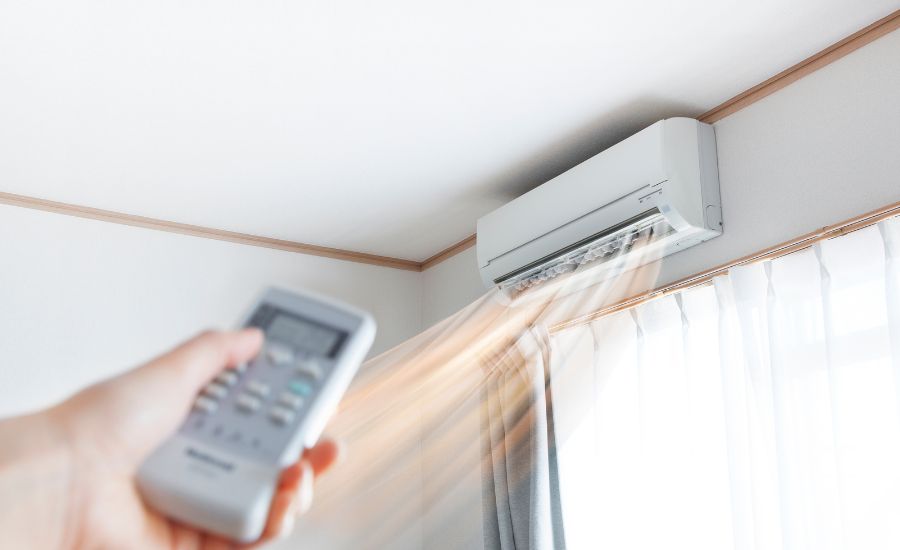Air conditioning units are common household and office appliances that provide relief during hot and humid weather. Their main characteristic is the cooling function that we all treasure during hot summer days.
With summer temperatures increasing, many people are considering purchasing an air conditioner. When the outside temperature becomes impossible to survive in, almost all air conditioners are switched on using hundreds of kilowatt/hour.
The power consumption of a 2-ton air conditioner is measured in watts, and it is crucial to determine how many watts an any-ton AC unit uses.

Contents
- 1 What types of home AC are there?
- 2 Choosing the AC unit
- 3 How many watts does the air conditioner use?
- 4 SEER ratings of air conditioners
- 5 Factors influencing the wattage of an air conditioner use
- 6 What are BTUs, and how many of them do I need for a cool home?
- 7 Reducing energy consumption
- 8 Maintenance
- 9 How much electricity and how many watts do the household appliances use compared to the central AC?
- 10 Generator size need for the proper AC use
- 11 How many tons does my AC have to be?
- 12 Comparing household appliances to home cool system
- 13 FAQ
- 14 Conclusion
What types of home AC are there?
Air conditioners can be either window AC units, portable AC units, or central air conditioning units.
Central air conditioners cool the entire interior of a building or home, using a network of ducts to distribute cool air within the space.
Central air conditioners are suitable for larger homes or buildings with multiple rooms that require consistent cooling.
Choosing the AC unit
When choosing an air conditioning unit, it is essential to determine how many watts it uses.
Watts are a unit of power that measures the rate of energy conversion or the amount of energy used in a certain period.
In mini split air conditioners, watts measure how much electricity the unit consumes.
The higher the wattage, the more energy the air conditioning unit uses.
How many watts does the air conditioner use?
The wattage that mini split air conditioners use is another essential factor to consider when choosing the right unit.
A 2-ton AC unit generally uses between 1,500 and 2,500 watts of power per hour.

SEER ratings of air conditioners
It is important to choose a central air conditioner with a high SEER rating as they are more efficient and consume less power.
It measures the efficiency of an air conditioning unit, and the higher the rating, the more efficient the unit is.
When purchasing an air conditioning unit, it is crucial to consider its cooling capabilities, power consumption, and efficiency rating to make an informed decision.
In the United States, the minimum SEER rating for air conditioners is 13, but more efficient units can have SEER ratings of 16 or higher.
Choosing a higher SEER-rated air conditioner can result in fewer watts used and lower the amount of how many watts one uses over time
Factors influencing the wattage of an air conditioner use
How much power a central AC uses depends on several factors such as the unit’s cooling capacity, efficiency rating, and temperature and humidity levels in the room.
On average, a 2-ton AC unit uses between 1,500 and 2,500 watts of power in an hour. However, the actual answer to the question of how many watts are used by an air conditioning unit depends on its efficiency rating, maintenance level, temperature, and humidity levels in the room.
What are BTUs, and how many of them do I need for a cool home?
When it comes to purchasing an air conditioner, one of the crucial factors to consider is the cooling capacity, which is measured in tons. Why in tons? Because before the exact amount of ice blocks was required to cool the place.
A 2-ton central air conditioner has an air conditioner capacity of 24,000 BTUs per hour and can cool an area of 900 to 1,200 square feet.
But in addition to cooling power, it’s crucial to understand how much electricity a unit consumes, measured in watts.
When it comes to calculating how many watts a 2-ton air conditioner will use, the energy consumption of a 24,000 BTU air conditioner is a useful reference point.
Typically, a 24,000 BTU aka 2-ton air conditioner consumes between 1,500 and 2,500 watts of electricity in an hour.

Reducing energy consumption
However, the actual answer to “how much power I use” can vary depending on several factors, including the SEER rating of the unit, which measures its seasonal energy efficiency ratio.
Another way to reduce energy consumption and lower electricity bills is to choose an appropriately sized air conditioner.
A unit that is too small for the space it needs to cool will have to work harder, consuming more than enough power and leading to higher bills. On the other hand, a unit that is too large for the space will cycle on and off more frequently, reducing its overall efficiency.
So what actually can I do to reduce the numbers, answering the question “How many watts does my 2-ton ac unit use?
In addition to choosing an appropriately sized and efficient air conditioner, there are other steps that can be taken to reduce energy consumption and lower electricity bills
For example, installing a programmable thermostat can automatically adjust the temperature, reducing energy consumption when no one is home
Using ceiling fans to circulate the air can also help reduce the load on the air conditioner, allowing it to operate more efficiently
Additionally, keeping windows and doors closed can prevent cool air from escaping and reduce the workload on the most air conditioners.
Maintenance
Regular maintenance is also crucial for maintaining the efficiency of an air conditioner and reducing energy consumption.
This can include cleaning or replacing air filters, checking refrigerant levels, and inspecting the unit for any signs of wear or damage.
By taking these steps, you can not only lower the amount of how many watts consumed but also minimize your environmental impact.
Opting for a unit that requires too much power may result in higher cooling costs, while choosing one that’s too small for the space may cause it to work harder and consume more power to cool the area adequately.
However, the actual wattage used will depend on factors such as efficiency rating, maintenance level, and temperature and humidity levels in the room.
By selecting a central 2-ton air conditioner with a high SEER rating and an appropriate size for your space, you can keep your energy bills low while enjoying a comfortable indoor temperature.
How much electricity and how many watts do the household appliances use compared to the central AC?
Compared to other appliances used at home, mini split air conditioners use a significant amount of electricity.
For instance, a standard washing machine uses between 300 and 500 watts per hour, while a 2-ton AC unit can use between 1,500 and 2,500 watts/hour.
This implies that running a central AC unit can consume up to five times more energy than running a washing machine.
Generator size need for the proper AC use
It’s vital to consider the electricity requirements and ensure that you have an adequate power supply when selecting a home air conditioner.
Regular maintenance and energy-saving practices can also help reduce energy consumption and lower the amount you spend on electricity.
A generator with a capacity of at least 5,000 watts is necessary to ensure that the air conditioner runs smoothly without overloading the generator.
When it comes to choosing a central AC for your space, it’s crucial to consider power consumption and the number of square feet of the space.
How many tons does my AC have to be?
If the unit uses too much power, it can result in high energy bills, while one that’s too small for the area will have to work harder, increasing the amount of how many watts used to cool the space adequately.
Calculating the cooling load of your space is essential before purchasing an air conditioning unit, as it helps determine the appropriate unit size.
Comparing household appliances to home cool system
Compared to other household appliances, most mini split air conditioners use a significant amount of electricity.
For example, a typical washing machine uses between 300 and 500 watts per hour, while an AC unit can use between 1,500 and 2,500 watts/hour, meaning that running an air conditioning unit can consume up to five times more energy than running a washing machine.
It’s crucial to consider the electricity requirements and ensure that you have an adequate power supply.
Regular maintenance and energy-saving practices can also help reduce energy consumption and lower the amount of money spent on how many watts you use.

FAQ
What size generator do I need to run a 2-ton AC unit?
When determining the generator size needed to power a 2-ton AC unit, it’s vital to check the power energy requirements and AC unit capacity of the unit and compare them to the wattage output of the generator to ensure. A generator with a minimum capacity of 5 kW is typically needed to power a 2-ton AC unit, but the exact size required may vary based on factors such as the unit’s efficiency, starting watts, and surge watts.
Will a 2000-watt generator run an air conditioner?
Regarding the number of watts that a 2-ton air conditioner uses, it typically uses between 1,500 and 2,500 watts/hour.
A higher SEER rating means lower energy bills, making it essential to choose a unit with a high SEER rating. It’s also crucial to consider the electricity requirements and ensure that you have an adequate power supply.
How many kW does a 2-ton AC use?
Regarding the question of how many kW can a 2-ton AC unit use, the answer is typically 3.5 kW per hour, although this may vary based on factors like the unit’s efficiency rating, operating conditions, and the climate it operates in.
It’s essential to keep in mind that the central AC unit’s starting wattage and surge wattage may require a generator with a higher capacity than its running wattage.
How many amps is a 2-ton AC?
Regarding the amperage draw of a 2-ton AC unit, it typically draws around 15-20 amps of electrical current when running, but this can vary based on the unit’s specifications and operating conditions.
It’s essential to consider the amount of how many amps needs an AC unit when determining the appropriate electrical wiring and circuit breaker size for the unit’s installation.
Conclusion
To sum up, choosing the right AC unit size, checking power requirements, and ensuring an adequate power supply are critical tasks for keeping energy bills low, and not worrying how many watts you will pay for. Regular maintenance and energy-saving practices can also help minimize electricity cost.


